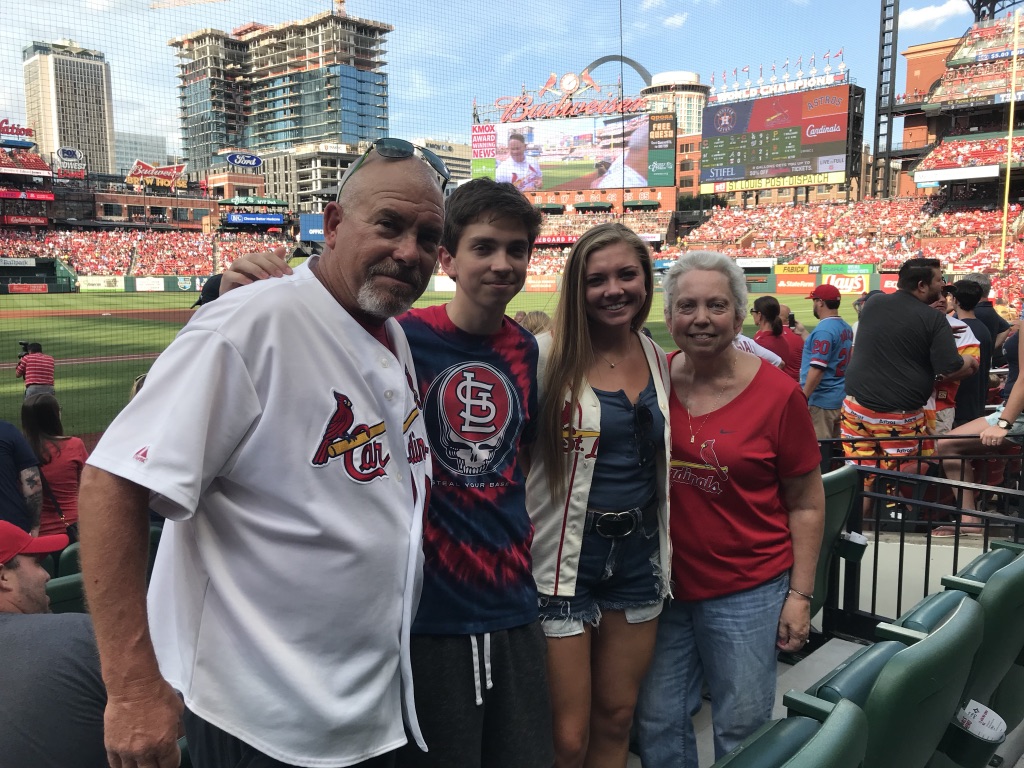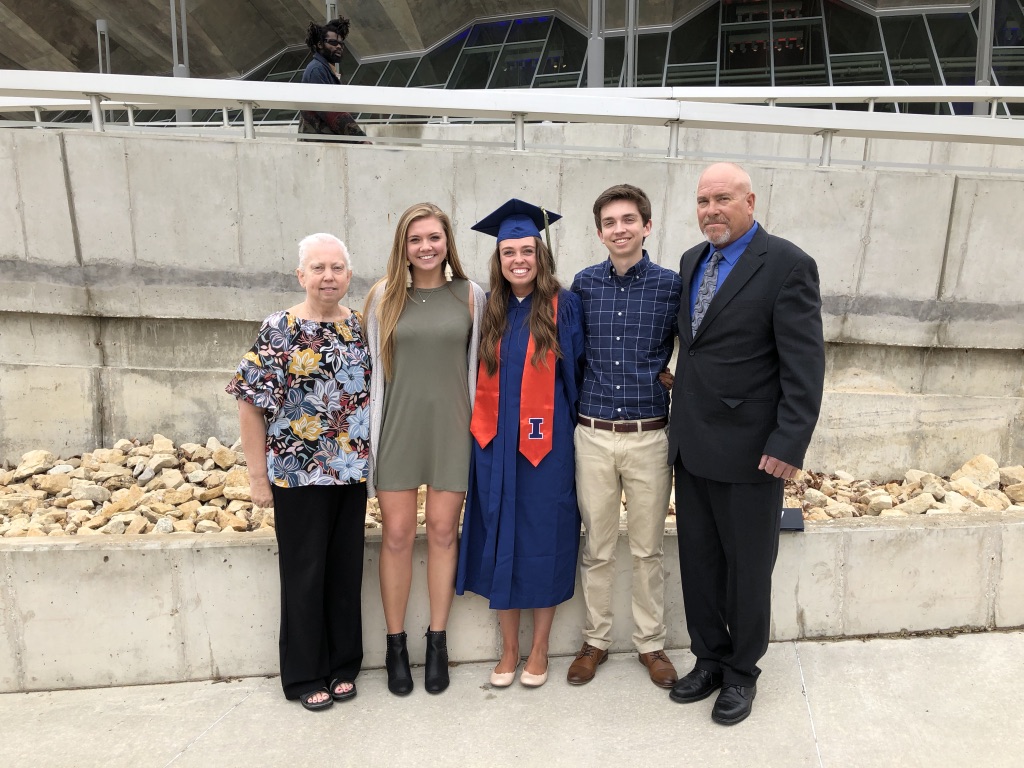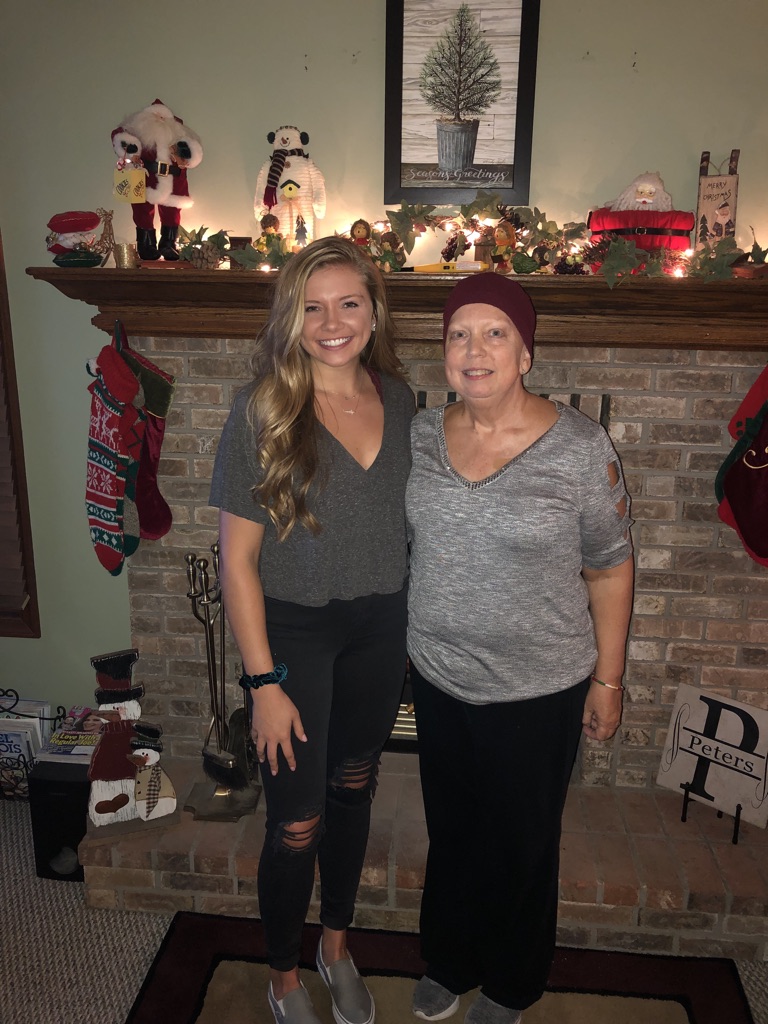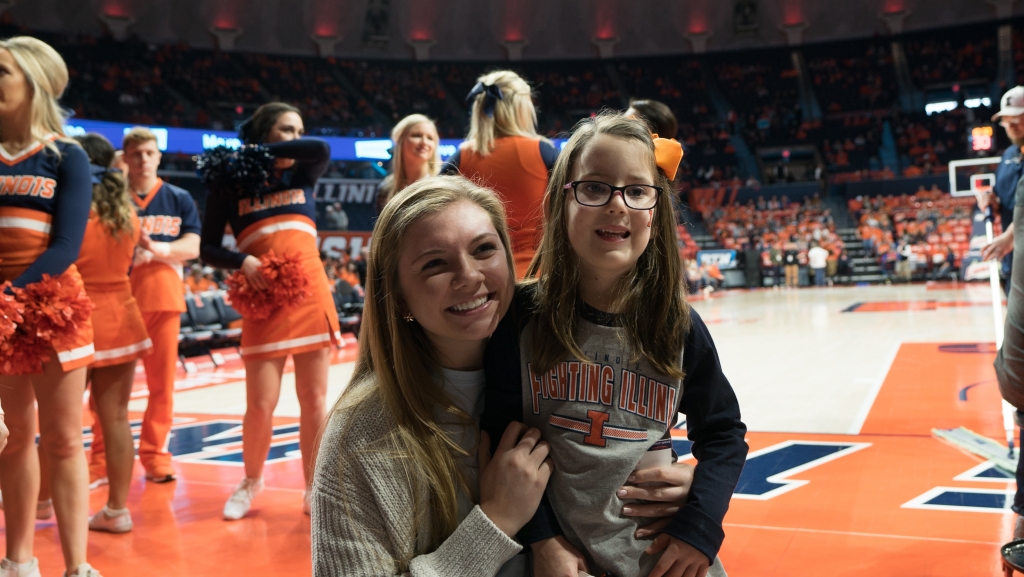When Rachel was a sophomore in high school, her mother was diagnosed with Stage II breast cancer. Four years later, as Rachel was adjusting to campus as a new transfer student, her mother’s cancer returned. Since that time, Rachel has worked hard to balance her UIUC schoolwork with her mother’s battle. She’ll be graduating this spring (an entire year early!) with a degree in Dietetics, and she can’t wait to spend more time with her mom.

When did you find out your mother had been rediagnosed?
“I had been here for maybe two months. It was the end of September, I remember, because my parents’ wedding anniversary is at the end of September. … She went to the doctor because she had a really bad cough. The first person that she saw told her it was an upper-respiratory infection, and then the next doctor gave her an inhaler. And then she went to her oncologist and said, ‘Look, I really don’t think that I’m okay. Something really seems wrong.’ And they’re like, ‘Okay, well, we’ll get your scans.’ … And they called her and said, ‘Yeah, Mary, we’re gonna need you to come in.’
“Well, it was breast cancer, Stage IV, meaning that it metastasized to basically everywhere in her body—mostly on her lungs, but it’s in her bones. … It was maybe a month or so before they confirmed the diagnosis. I was here pretty much that whole time because you can’t just pack up and leave, you know?”

When did they start treatment?
“Mom went through her first round of chemo, it was like six months in the fall and then the spring. At the beginning of that semester, things were getting worse. … I went home for spring break. I came home from babysitting one day, and my mom was lying in bed. She hadn’t moved all day. It was like four o’clock in the afternoon. And I said, ‘What are you doing?’ She said, ‘I don’t know. I don’t feel right.’ And I’m like, ‘Okay, it’s four o’clock in the afternoon. Nobody’s been here all day. Why haven’t you called your doctor?’ She said, ‘Oh, they’re just gonna tell me to go to the hospital.’ I said, ‘Okay, then maybe we need to go to the hospital.’
“So we ended up going to the ER. … They did all kinds of tests. It turns out she had pneumonia, which is not good for somebody who’s battling cancer. So she was in the hospital the rest of spring break. It was really tough leaving her in the hospital and coming back for classes. I remember vividly, I came back Sunday, and it got to Tuesday. It was the day she was supposed to be going home from the hospital. Then they said, ‘No, we’re going to transfer her to another hospital.’ And I’m like, ‘Are you kidding me?’
How did you manage school at this time?
“I ended up emailing all of my professors saying, ‘My mom’s been in the hospital for the past eight days. … I just think that I really need to be home right now.’ And all them were super understanding. They didn’t penalize me. I mean, I think there are going to be professors that are going to sit there and tell you, ‘Too bad.’ I think there definitely are. But every professor I had, whether it was a general class or my dietetics curriculum in the FSHN department, they just immediately said, ‘Do what you need to do. We’re going to be here whenever you get back; we’ll catch you up.’
Wow, that’s really great. Is there anyone in particular who has really helped you throughout the process?
“[My professor] was one of the biggest blessings here for sure. … He [first] helped me [that past] fall. It was a different instance. I came to him and I said, ‘Yeah, I’m here to take that exam early. I emailed your TA about it.’ And he goes, ‘Let’s go to my office and talk.’ And I’m like, ‘Oh, geez.’ This is the first time I had talked to the professor. I’m freaking out, because the exam is going to be tough anyway.
“He sits down and he says, ‘I don’t think you should take this exam today.’ I say, ‘Okay, but I studied really hard for it.’ And he goes, ‘How about you just take it whenever you come back? Take your time, go home, see your mom, do what you need to do, and let me know whenever you’re ready to take it. And as far as I’m concerned, I think you’re finished with this class.’ I had an A, I did all my assignments, everything like that, and there were only two or three weeks left in the semester.
“He goes on to tell me that he lost his mom to cancer whenever he was in graduate school. He was across the country while his mom was back home battling at a time where a payphone was how he was gonna be in contact with her. What that said to me was, ‘There are people here who are just like you. Everyone’s battling something.’ It’s so cliché, but it’s true. …
“I got back in touch with him that spring semester … . I asked, ‘Hey, is it okay if we meet up and talk?’ … After [my mom] was battling pneumonia, they said, ‘Let’s try to give your body a break.’ … They started a pill treatment, a pill form of chemotherapy. So I talked to him about that. … I also talked to him about how I was ready to be home. I wanted to be there for her. Her last battle, I was there for literally every second of the day. And being here, it’s just like my hands are tied to a chair. …”
Anyway, I’m still in touch with him. [I’m also] always in touch with Ms. Karduck [my academic advisor]. She’s pretty much held my hand through this whole thing.”
How is your mom doing now?
“My mom is doing okay, as good as she probably can be. We’re pretty much at the end of the list on options for treatment. Nothing’s really working, but she’s clearly a fighter because she’s still here.”

How do you keep moving forward?
“I don’t know, honestly. I think about that sometimes, too. … Sometimes you just have to let stuff happen the way it’s meant to happen. Everybody says, ‘Everything is going to happen the way it should,’ or ‘What’s meant to be will be,’ and blah, blah, blah. But you really just have to, I don’t know, I guess you just have to keep digging.
“I just keep pushing. I say it all the time, and I’ve said it to just about everybody: I felt like (and sometimes I still do) that I was on a ship that was sinking, and I saw the shore and the shore was graduation and getting back home. And I can see it. I’m just hoping that I make it there. If you even just have that little bit of hope that you’re gonna make it there, you’re probably gonna make it there.”
What are your plans after graduation?
“I want to work in oncology. I was set on sports nutrition. I interned with the football team dietitians here because I love strength training and working out and all that fun stuff, and pairing it with nutrition is just the golden key. But I realize they’ve got what they need—they’ve got fitness professionals and plenty of nutritionists who are into that.
“So I definitely want to be with oncology. I think it’s from my mom’s experience. Trying to talk to a patient in a clinical setting after they’ve gone through chemo treatments, after they’ve been to the hospital three times that week, they don’t want to sit and talk to you about their diet.
“I’m hoping to either do a private practice or something through a program where I meet with the patients at their home—somewhere they’re comfortable, somewhere they’re actually willing to talk about it. Their diet is really going to help with their battle, and they’re not going to listen to you in the hospital, they’re really not. So that’s the plan after.”

How has your experience changed your outlook?
“It’s just finding a lesson in everything that’s happened. Being mindful was my biggest goal last year. You know, just take it all in—if you’re walking and your mind’s going crazy, think of one thing that you can touch, one thing that you can see, one thing that you can hear or smell. You have to train yourself to put everything on pause and really consider what is actually happening. Otherwise, you’re gonna miss it.”
What would you say to others who are trying to balance college life and a personal struggle?
“I don’t want to say you’re not alone, because that’s what everybody says. But I think it’s really important to sit down and, for even five minutes, put yourself first. Scratch the school, scratch the homework, scratch your friends. Maybe leave your parents and your family up there, but sit down and really think, ‘What’s going on? What’s wrong? What needs to be better? What is making all of this so terrible, and what can I do to make the best of this situation?’ …
“You have to make the time for yourself, and you have to figure out what’s going to be best for yourself. Because if you don’t, you’re just gonna keep drowning. I felt like that for five or six months, but I realized that I can’t do it alone. And you shouldn’t do it alone. Ever. … You just have to sit down and accept the fact that there are people here to help you.”